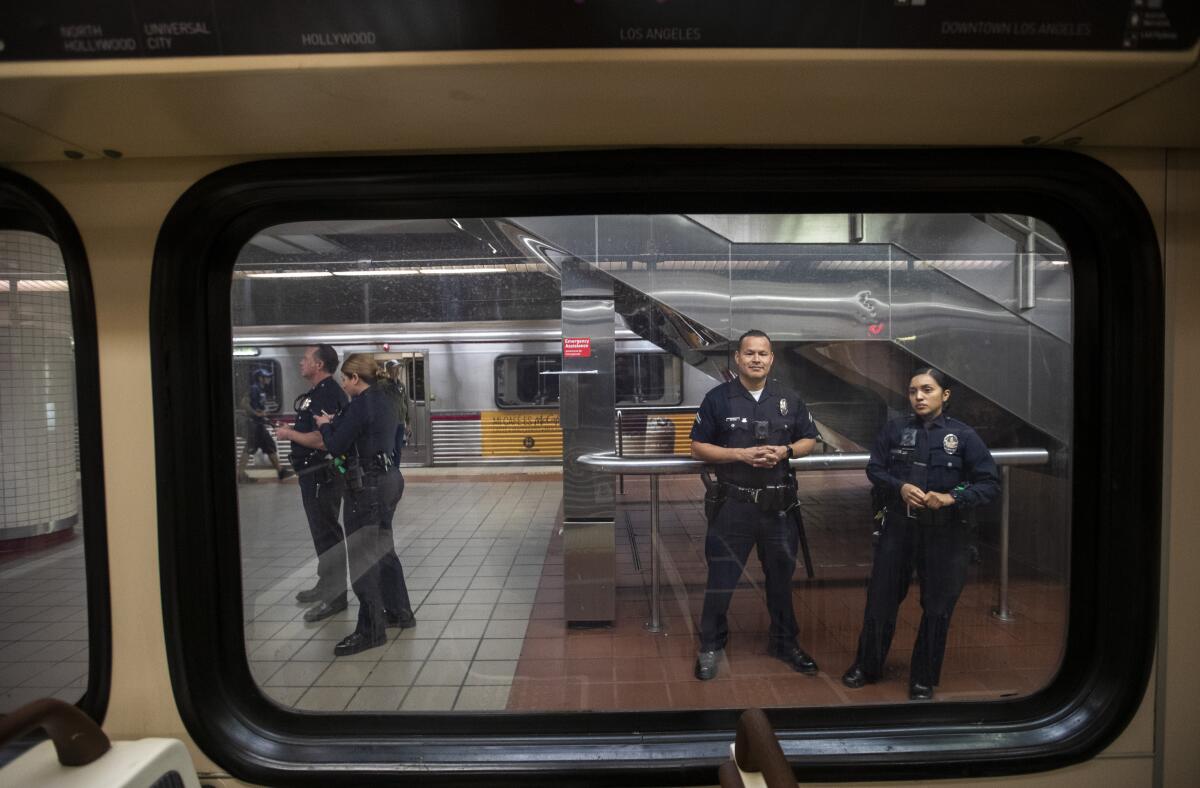Calls to defund the police spread to L.A.’s transit system

- Share via
As calls to defund police have grown into a chorus in the wake of the George Floyd protests, some Los Angeles County activists are turning their attention to the sprawling transit system.
The cost to police the Metropolitan Transportation Authority’s 1,433-mile service area, including 93 rail stations and nearly 14,000 bus stops, is nearly $650 million over five years.
Activists and community groups argue that, on a system where violent crime is relatively low, the money could be better spent: on free fares, on better and more frequent service, on homeless outreach workers.
“When we ask for these improvements, Metro says money is tight,” said Oscar Zarate, an organizer with the community advocacy group SAJE. “We say, ‘Well, if the budget is tight, we know where you can look.’”
Since 2017, Metro has split policing duties between the Los Angeles Police Department, which patrols buses, trains and stations in the city of L.A.; the Long Beach police, who work at eight Blue Line stations; and the L.A. County Sheriff’s Department, which patrols the rest of the system. The contracts expire in 2022.
Metro’s directors will consider this week whether to move toward a “community-based approach” to policing, including no longer sending sworn officers to respond to nonviolent crimes.
Los Angeles City Councilman and Metro Director Mike Bonin, who introduced the motion, said Thursday that he hears routinely “from young people, particularly young people of color, that they feel that they are treated differently on the system.”
Directors will also consider asking Metro officials to evaluate use-of-force policies and to make recommendations on further reform, including spending more on homeless outreach.
The policy would be a first step toward rethinking policing, said Metro Director and county Supervisor Janice Hahn, who introduced the motion. But, she said, Metro will “probably always have a layer of law enforcement or police that may be armed.”
The push for police reform at Metro comes as other transit agencies in the U.S. have made changes to their policing practices.
Transit officials in Portland, Ore., trimmed the policing budget by $1.8 million. Boston’s transit police department banned the use of choke holds. And in Washington, D.C., officials have said they are developing a plan to address systemic racism on the subway, including longstanding complaints that officers checking fares target Black teenagers.
In L.A., police officers patrol the system, work with homeless outreach teams, and help security guards perform fare checks, Metro spokesman Dave Sotero said. Were Metro to make cuts in the future and “remove these elements, we do not see where we could continue to provide these services,” he said in an email.
Metro’s policing contracts pay for 11 LAPD officers, `11 sheriff’s deputies and three Long Beach officers who do homeless outreach, Sotero said. That work represents $18.4 million of the $645.7-million cost.
Metro also spends about $5 million annually for eight teams of social workers who help assist homeless riders. Over a 10-month period ending April 30, they helped 1,645 people find temporary housing, and 250 people move in to permanent housing, Metro said.
A thoughtful rethinking of Metro’s police deployment could free up money for a “tremendous increase” in homeless outreach workers, to address the most pressing issue on the system, said Bart Reed, the executive director of the Transit Coalition.
The biggest threat to bus riders is rarely a robbery or a shooting, he said, but someone with a mental illness who is yelling, harassing or attacking the bus driver, other passengers or themselves. The best way to help that person is not by putting them in handcuffs, he said.
“The whole city is becoming unglued, and we aren’t really reacting to help address the worst of the problems,” Reed said. “With all that going on, do we need three or four cops standing in a group at the 7th Street Metro station?”
How Metro would address violent crimes such as rape, robbery and assault without a police force is still being discussed, activists said. But, Zarate said, “we cannot let those things stifle our imaginations around what safety can look like.”
Metro’s decision to hire multiple police agencies followed a blistering audit in 2014 which found that assaults, robberies and other violent crimes had soared while the sheriff’s department had sole oversight of the transit system.
Assaults on bus drivers and complaints of sexual harassment were surging, while ridership plummeted. In a survey in 2016, 29% of former riders said they left Metro because they felt unsafe or uncomfortable.
“We’ve heard from our transit riders loud and clear that they want and expect improved safety and security on our system,” Sotero said in an email.
The new policing contracts nearly doubled the number of armed officers. Metro also spent more than $100 million on private security guards. That approach has led to a nearly 23% decline in reported violent crime between 2015 and 2019, Sotero said.
Metro also shifted fare-checking duties from police officers to Metro guards who issue $75 administrative citations, not misdemeanor charges.
Seeing police officers and fare checkers on the Gold Line “does not imply safety to me,” said Leticia Andrade, a Metro rider who lives in Boyle Heights. Fare checkers can single out and harass young Latino and Black riders, she said, and seeing their weapons makes her nervous.
Thurmon Green, 29, a bus rider in Mid-City, said he has seen passengers tense up when an LAPD officer boards. If police have to play a role on transit, he said, “it should be a very, very small one — minuscule.”
“The presence of a gun, it transforms the space,” Green said. “It does not make people feel safer.”
More to Read
Sign up for Essential California
The most important California stories and recommendations in your inbox every morning.
You may occasionally receive promotional content from the Los Angeles Times.











